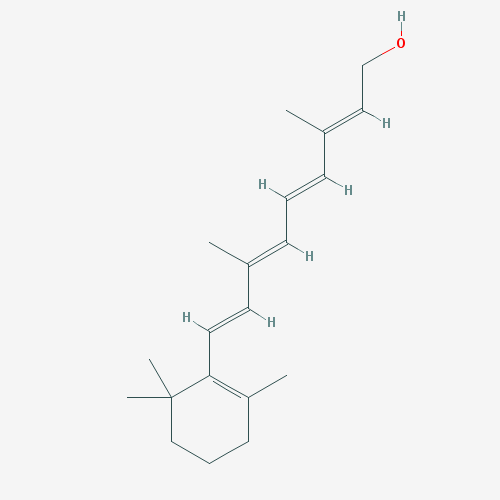Retinol: Difference between revisions
Jump to navigation
Jump to search
imported>Mfisher |
imported>Mfisher |
||
| Line 1: | Line 1: | ||
==Description== | ==Description== | ||
Retinol is the fat soluble vitamin retinol. Vitamin A binds to and activates retinoid receptors (RARs), thereby inducing cell differentiation and apoptosis of some cancer cell types and inhibiting carcinogenesis. Vitamin A plays an essential role in many physiologic processes, including proper functioning of the retina, growth and differentiation of target tissues, proper functioning of the reproductive organs, and modulation of immune function. | Retinol (all-trans-retinol) is the fat soluble vitamin retinol. Vitamin A binds to and activates retinoid receptors (RARs), thereby inducing cell differentiation and apoptosis of some cancer cell types and inhibiting carcinogenesis. Vitamin A plays an essential role in many physiologic processes, including proper functioning of the retina, growth and differentiation of target tissues, proper functioning of the reproductive organs, and modulation of immune function. | ||
[[File:Retinol.png|frame|right|Retinol structure, image from PubChem]] | [[File:Retinol.png|frame|right|Retinol structure, image from PubChem]] | ||
Latest revision as of 11:05, 22 August 2016
Description
Retinol (all-trans-retinol) is the fat soluble vitamin retinol. Vitamin A binds to and activates retinoid receptors (RARs), thereby inducing cell differentiation and apoptosis of some cancer cell types and inhibiting carcinogenesis. Vitamin A plays an essential role in many physiologic processes, including proper functioning of the retina, growth and differentiation of target tissues, proper functioning of the reproductive organs, and modulation of immune function.

Genes Affected
Suppliers
Usage Notes
References
>183 Xenbase articles contain a reference to Retinol according to textpresso